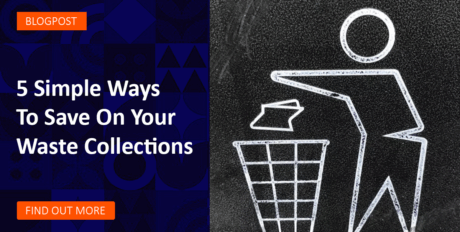Contact us today for your Free Quote
Food waste recycling has become a critical part of addressing climate change and environmental sustainability. In the UK, food waste accounts for a staggering 9.5 million tonnes each year, with significant amounts of this waste being avoidable. At Bywaters, we are dedicated to providing efficient and responsible food waste recycling services to households and businesses, helping them divert organic waste from landfills and contribute to a circular economy.
Why Food Waste Recycling Matters
Food waste that ends up in landfills decomposes anaerobically, producing methane, a greenhouse gas 25 times more potent than carbon dioxide. This is one of the primary reasons that reducing and recycling food waste is essential for combatting climate change. According to the UN, 8-10% of global greenhouse gas emissions are linked to food that is produced but never consumed.
Recycling food waste is not just about environmental responsibility; it also helps conserve resources. Water, energy, and labour used to produce food that ultimately ends up wasted can be saved through better management. By recycling, we can convert organic waste into useful resources like biogas or compost, which further supports sustainable practices.
Practical Steps to Reduce and Recycle Food Waste
Separate Food Waste for Recycling
One of the simplest ways to contribute to food waste recycling is by separating food waste from general waste. Bywaters offers dedicated food recycling services in London, providing businesses and households with the tools they need to dispose of organic waste responsibly. We ensure that food waste is collected and sent to facilities where it can be processed through anaerobic digestion or composting.
As noted by the British Heart Foundation, separating waste at home can reduce the amount of food ending up in landfills. Small steps like using leftovers creatively and monitoring portion sizes to cut down on waste are recommended.
Anaerobic Digestion and Composting
There are two key methods for recycling food waste: anaerobic digestion and composting.
- Anaerobic digestion: This process involves breaking down food waste in an oxygen-free environment, producing biogas (which can be used as renewable energy) and a nutrient-rich digestate used as a fertiliser. Anaerobic digestion is a highly effective solution for large volumes of waste, reducing the carbon footprint of waste disposal. Organisations such as the Anaerobic Digestion & Bioresources Association (ADBA) advocate for wider adoption of this technology.
- Composting: Composting is a natural process where organic materials break down in the presence of oxygen, turning food scraps into nutrient-rich compost. For homes with gardens or businesses in agriculture, composting offers a practical and eco-friendly way to recycle food waste.
Embrace Technology to Reduce Food Waste
Technology plays an increasingly important role in food waste reduction introducing various
At Bywaters, we leverage cutting-edge technology to help our clients reduce food waste and minimise their environmental impact. One of the most innovative solutions we offer is the ORCA, a clean and efficient on-site food waste disposal system.
ORCA mimics the natural digestion process, breaking down food waste with the help of microorganisms inside a compact container. The result is a liquid by-product that can be safely expelled down your waste pipe, eliminating the need to transport food waste off-site. This innovative system helps you reduce vehicle movements, minimise CO₂ emissions, and eliminate odours typically associated with food waste disposal.
ORCA’s real-time sustainability data provides detailed reporting, helping businesses manage their food waste consumption more efficiently. These reports enable teams to create food waste minimisation strategies, improve staff efficiency, and reduce waste management costs.
Whether your business is small or large, there’s an ORCA model to fit your needs. With units capable of processing anywhere from 160kg to 1 tonne of food waste per day, ORCA delivers sustainable and operational benefits for any operation.
With 40% of food waste in the UK still ending up in landfills, the ORCA system offers a transformative solution. By intercepting food waste before it reaches landfills, ORCA helps your business reduce its carbon footprint and waste management costs, all while supporting a more sustainable future.
Redistribute Surplus Food
Not all food waste needs to be wasted. Platforms like FareShare help redistribute surplus food from businesses to charities, ensuring it is used rather than discarded. Many food outlets, supermarkets, and restaurants are embracing this initiative, helping feed those in need while reducing food waste.
For businesses, especially in the hospitality industry, implementing portion control, smaller serving sizes, and offering takeaway options are also effective ways to reduce the amount of food left uneaten and eventually wasted.
Bywaters: Leading the Way in Food Waste Recycling
At Bywaters, we provide comprehensive food waste recycling services designed to make a difference in London. Our services help businesses and households separate and collect food waste in a way that ensures it is processed responsibly, turning it into valuable resources.
Our approach is simple but effective:
- Food Waste Collection: We supply bins and bags specifically for food waste, which are then collected by our team at regular intervals to be sent for recycling.
- Recycling Facilities: Our recycling facilities use anaerobic digestion to convert food waste into renewable energy and fertilisers.
- Sustainability Partnership: We work closely with clients to create tailored solutions that maximise waste diversion from landfills, reducing their environmental impact.
Upcoming Regulations and Industry Standards
The UK government is introducing new legislation aimed at enhancing food waste recycling from both households and businesses. Under this legislation, waste collection authorities in England will be required to arrange weekly collections of food waste from households for recycling or composting. Additionally, non-household municipal premises, such as offices, schools, and public sector buildings, will be required to arrange for the separate collection of food waste in accordance with these regulations. However, these premises are not mandated to have weekly collections.
The government’s preference is for food waste to be processed through anaerobic digestion (AD), which presents the best environmental outcome. AD not only generates bio-fuel, which can be injected into the gas grid, but also produces digestate that can be used as a fertiliser, contributing to the circular economy by recycling valuable nutrients back into the soil.
To further support the expansion of AD facilities, the government has introduced the Green Gas Support Scheme (GGSS). This scheme will provide financial incentives to AD facilities by paying tariffs for the biomethane produced and injected into the gas grid for a period of up to 15 years. The initiative aims to increase the capacity for sustainable food waste treatment across the UK.
Materials eligible for the food waste stream include all food intended for human or household pet consumption, along with biodegradable materials like bones, eggshells, fruit and vegetable skins, tea bags, and coffee grounds. Detailed statutory guidance will be provided to clarify what should not be included in the food waste stream, ensuring compliance with the Environmental Protection Act 1990.
Businesses, particularly those in the hospitality, retail, and food service sectors, will need to align their waste management practices with these new regulations. This will ensure they are not only compliant but also contribute to the UK’s sustainability goals by diverting food waste from landfills and reducing greenhouse gas emissions.
The Future of Food Waste Recycling in London
Food waste recycling is more than a trend—it’s a necessity for a sustainable future. As London continues to grow, so too must its commitment to reducing waste. At Bywaters, we believe in a future where businesses and households work together to tackle food waste. By implementing innovative recycling solutions, fostering partnerships, and engaging with communities, we can make London one of the greenest cities in the world.
But it’s not just about waste management—it’s about creating a cultural shift toward sustainability. As the UN stresses, we need to treat food as a valuable resource, and recycling is one of the key ways to do this.
More posts:
BRAD Patch Notes
Discover the latest enhancements to Bywaters’ BRAD dashboard. Get unparalleled insight into waste data, improved performance, and stronger sustainability reporting.
Read more5 Simple Ways To Save On Your Waste Collections
We have put together a guide of 5 simple ways you can save money on your waste collections whilst improving your environmental impact.
Read moreWorld Oceans Day 2025
World Oceans Day 2025 highlights the critical ocean plastic crisis. Explore facts, global efforts, and Bywaters’ advanced solutions like Nando AI, creating a circular economy for our oceans.
Read more




